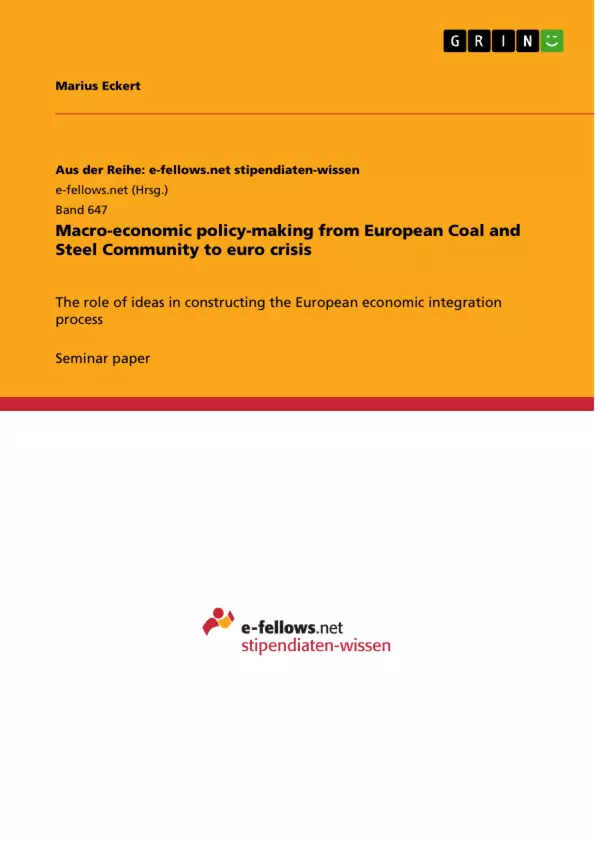Economic integration is widely considered to be the driving force of the European project and is by today much further developed than the political integration of the EU member states. Starting with the European Coal and Steel Community (ECSC) economic integration developed by deepening and widening its scope; including up to date 27 member states which share a common internal market, among them 17 nations which also share the euro as a common currency. This so-called euro zone entered a phase of crisis from 2010 onwards and the joint policy response was a “muddling-through tactic” comprising of step-by-step financial assistance and cautious further economic integration.
This paper is situated in the outlined context and is concerned with the interaction of ideas and the economic integration process up to today’s euro crisis management. Thus the analysis will set out to answer a two-fold research question: “To what extent did ideas construct the European Economic and Monetary Union (EMU) and how does this determine the current crisis policy patterns?”
The theoretical framework is based on the theory of the ideational life-cycle which aims at explaining the role and transformative power of ideas among macro-economic policy elites in constructing social realities. It seems promising because European integration has been an elite-led project and policy implementation was merely top-down, especially in the field of economic integration.
The paper subsequently reconstructs and analyzes the changing nature of ideas in determining national and European level economic thinking from the ECSC to the revised Stability and Growth Pact within the EMU. Building on these insights the patterns of current policies dealing with the euro crisis are examined.
The paper argues that the German ordo-liberal economic understanding has been implemented also on the European level during the 1970s/80s period of economic downturn and uncertainty within the political elite. It then became firmly institutionalized with a more monetarist stance and continues to influence the policy decisions of today’s European elite. This explains the fixation on ‘sound’ money and finances as expressed in the crisis therapies that can currently been witnessed in Europe. Emphasizing this theoretical perspective helps to uncover path-dependencies which will determine future policies and the scope for changes.
Inhaltsverzeichnis (Table of Contents)
- Introduction
- The changing nature of ideas during the ideational life-cycle
- Constructing the EMU: The impact of ideas from ECSC to common currency
- The euro crisis management and the prevailing role of internalized ideas
- Conclusion and Implications
- References
Zielsetzung und Themenschwerpunkte (Objectives and Key Themes)
This paper explores the interplay between ideas and the European economic integration process, specifically examining how ideas have shaped the construction of the European Economic and Monetary Union (EMU) and how these underlying ideational patterns influence current crisis management policies. It seeks to answer the question of how influential ideas have been in constructing the EMU and how this determines the current crisis response strategies.
- The role of ideas in shaping economic integration
- The impact of the ideational life-cycle on macro-economic policy
- The influence of German ordo-liberalism on European economic policy
- Path-dependencies and their impact on future policies
- The role of elites and institutionalization in the ideational process
Zusammenfassung der Kapitel (Chapter Summaries)
- Introduction: This chapter introduces the concept of European economic integration, highlighting its significance in the broader European project and its evolution from the ECSC to the current state with 27 member states and 17 eurozone nations. The paper then presents its focus on the interaction of ideas and economic integration, particularly in relation to the euro crisis management.
- The changing nature of ideas during the ideational life-cycle: This chapter introduces the theoretical framework of the ideational life-cycle as presented by Marcussen (1998). The theory explains how ideas held by macro-economic policy elites influence their thinking, behavior, and identities, shaping policy discourse and ultimately constructing social realities. The chapter details the different stages of the ideational life-cycle, from ideational vacuum to institutionalization, highlighting the role of elites in promoting specific ideas and creating path-dependencies.
- Constructing the EMU: The impact of ideas from ECSC to common currency: This chapter delves into the historical development of European economic integration, starting with the ECSC and tracing the impact of various ideas on the creation of the EMU. It explores the role of German ordo-liberalism in shaping economic thinking and policy decisions during the 1970s and 1980s, highlighting its influence on the EMU's formation.
Schlüsselwörter (Keywords)
This paper explores the influence of ideas on the European economic integration process, specifically focusing on the ideational life-cycle, German ordo-liberalism, path-dependencies, and elite-driven policy-making within the European Economic and Monetary Union (EMU) and its crisis management.
Frequently Asked Questions
What role did ideas play in the construction of the EMU?
Ideas held by macro-economic policy elites were fundamental in shaping the European Economic and Monetary Union (EMU). These ideas constructed social realities and guided the top-down implementation of integration policies.
What is German ordo-liberalism's influence on European policy?
German ordo-liberalism, which emphasizes price stability and fiscal discipline ("sound money"), became institutionalized at the European level during the 1970s and 80s and continues to dominate eurozone crisis management.
How does the "ideational life-cycle" explain policy changes?
The ideational life-cycle theory suggests that ideas go through phases from a "vacuum" during crises to institutionalization. Once an idea is institutionalized, it creates path-dependencies that determine future policy responses.
Why was the response to the 2010 euro crisis described as "muddling-through"?
The response was characterized by step-by-step financial assistance and cautious integration rather than fundamental reform, largely due to the prevailing internalized ideas of the European elite.
What are path-dependencies in economic integration?
Path-dependencies refer to the way previous institutional decisions and dominant economic ideas limit the scope of future policy changes, making it difficult to deviate from established strategies like austerity.
- Quote paper
- Marius Eckert (Author), 2013, Macro-economic policy-making from European Coal and Steel Community to euro crisis, Munich, GRIN Verlag, https://www.grin.com/document/209811



